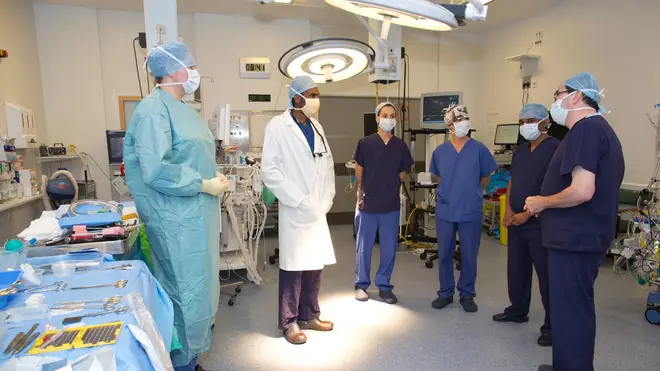
Clive Bull 1am - 4am
1 December 2021, 13:46 | Updated: 4 January 2022, 12:36

Up to 740,000 "urgent" GP referrals for suspected cancer cases have been "missed" during the pandemic, a damning report has warned.
The National Audit Office (NAO) said the NHS care backlog has led to tens of thousands fewer people being diagnosed with cancer than expected.
According to the analysis, in England there were between 240,000 and 740,000 "missing" GP referrals for suspected cancer during the period of the pandemic up to September 2021.
It has resulted in around 35,000 to 60,000 fewer people starting treatment for cancer than would have been expected.
Labour's new shadow health secretary said he was "worried" by the report, telling LBC the government "urgently" needs an elective care recovery plan.
Wes Streeting drew on his own experience with kidney cancer, where the disease was only picked up because he was getting a scan for another reason.
He said "timing is everything" with cancer, as he urged ministers to publish their recovery plan to tackle the backlog which has built up throughout the pandemic.
Read more: 'No need to change Christmas plans' despite Omicron fears, says Sajid Javid
Read more: Racist Sheffield street names will not be replaced, council says

Shadow Health Secretary 'worried' by cancer backlog
Mr Streeting told Nick Ferarri at Breakfast: "I had kidney cancer earlier this year and went through successful treatment for that.
"When it comes to cancer treatment and cancer outcomes, timing is everything.
"I'm very worried that we've got an NHS backlog approaching six million already - that's set to increase significantly in the next few years and waiting times are set to worsen.
"In my case, the only reason I knew I had kidney cancer, the only reason I'm talking to you this morning cancer free, is because I have kidney stones.
"In a scan for something entirely different, my cancer was detected.
"In that big NHS backlog, for all sorts of operations, there will undoubtedly be cancer cases that will go undetected.
"That's why we urgently need an elective care recovery plan from the Government to get those NHS waiting lists down, to shorten waiting times and speed up cancer treatment, because when it comes to cancer, timing is everything."
The NAO report also warned the overall NHS waiting list could double to 12 million by March 2025.
Read more: Murder probe launched after missing 16-year-old found dead in Scotland
Read more: First accuser claims Ghislaine Maxwell watched Epstein sexually abuse her when she was 14

Health Secretary warns NHS waiting list will go up before it goes down
Commenting on the report, Eve Byrne, head of campaigns and public affairs at Macmillan Cancer Support, said: "This report confirms what we hear day in, day out from people living with cancer.
"Chronic staffing shortages are already having a devastating impact on cancer patients, and we have major concerns that is only set to worsen without urgent action.
"It could not be more vital that the Government's imminent Elective Recovery Plan for England includes a clear plan for getting people diagnosed with and treated for cancer.
"This needs to be backed up by steps to ensure we have enough nurses so that the NHS is equipped to provide timely and quality care for all people with cancer - both now and in the future.
Read more: Three students killed and six injured in US high school shooting
Read more: Greece: Unjabbed over-60s face monthly 100 euro fine as mandatory vaccines introduced

Caller shares how wife died after waiting five hours for an ambulance.
"Without these critical pieces of the puzzle, we risk increasing numbers of people facing later diagnoses, poorer care and potentially worse chances of survival. This has to change."
A spokesperson for the NHS in England added: "Treating more than half a million patients in hospital for Covid, as well as delivering a world-leading vaccination programme, has inevitably had an impact on some routine and non-urgent care, yet since the pandemic begun the NHS has performed millions of elective procedures and over 450,000 people have started treatment for cancer.
"NHS staff are now pulling out all the stops to recover elective activity levels, making good use of additional resources to open new surgical hubs and diagnostic centres, develop innovative ways of working and perform more operations, tests, checks and scans, so anyone who is concerned about their health should come forward so the NHS can help you."